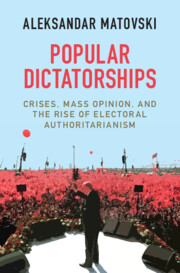Book contents
- Popular Dictatorships
- Popular Dictatorships
- Copyright page
- Dedication
- Contents
- Figures
- Tables
- Acknowledgments
- 1 A “Perfect Dictatorship?” The Puzzle of Electoral Authoritarianism
- 2 Crises, Popular Opinion, and Electoral Authoritarianism
- 3 The Crisis Roots of Electoral Authoritarianism: A Macro-Level Analysis
- 4 The “Strongman” Electoral Authoritarian Appeal: A Comparative Analysis
- 5 Crises, Popular Opinion, and the Realignment of Political Competition in Russia
- 6 Is Russia Unique? The Strongman Heresthetic in Comparative Perspective
- 7 Conclusions and Implications
- Bibliography
- Index
1 - A “Perfect Dictatorship?” The Puzzle of Electoral Authoritarianism
Published online by Cambridge University Press: 04 November 2021
- Popular Dictatorships
- Popular Dictatorships
- Copyright page
- Dedication
- Contents
- Figures
- Tables
- Acknowledgments
- 1 A “Perfect Dictatorship?” The Puzzle of Electoral Authoritarianism
- 2 Crises, Popular Opinion, and Electoral Authoritarianism
- 3 The Crisis Roots of Electoral Authoritarianism: A Macro-Level Analysis
- 4 The “Strongman” Electoral Authoritarian Appeal: A Comparative Analysis
- 5 Crises, Popular Opinion, and the Realignment of Political Competition in Russia
- 6 Is Russia Unique? The Strongman Heresthetic in Comparative Perspective
- 7 Conclusions and Implications
- Bibliography
- Index
Summary
Originally dismissed as inherently unstable, transitional polities, electoral autocracies have become the most widespread and resilient form of authoritarianism in the world today. Chapter 1 surveys this phenomenon and its interpretations in the literature. It also introduces the book’s core argument that electoral autocracies have thrived due to their genuine popular appeal in societies plagued by turmoil.
Keywords
- Type
- Chapter
- Information
- Popular DictatorshipsCrises, Mass Opinion, and the Rise of Electoral Authoritarianism, pp. 1 - 32Publisher: Cambridge University PressPrint publication year: 2021

